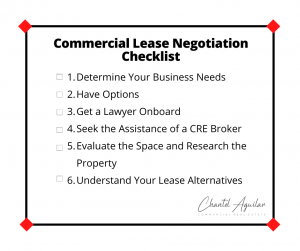Knowing what aspects to pay attention to while negotiating a commercial lease can be challenging. With that in mind, today we bring you a commercial lease negotiation checklist to help you stay organized.
Commercial Lease Negotiation Checklist
Every lease negotiation is unique. No two businesses have the same needs and goals, and no two facilities are exactly the same. However, there are some basic steps that are common to most situations.
These six phases provide a roadmap to guide you through the negotiation process and help you avoid some of its most common pitfalls.
1. Determine Your Business Needs
As in any negotiation, the first thing to do when you negotiate a commercial lease is to have a clear picture of your business needs. Keep in mind that this doesn’t refer only to your current needs. Companies evolve, so any property you lease should be able to support the growth of your business throughout the duration of the lease.
2. Have Options
Even if you have a location in mind that you consider ideal, make it a point to identify several suitable alternatives. Locking yourself into a single option curtails your maneuvering space. In addition to giving you a deeper insight into the local real estate market, having options empowers you during the negotiation.
3. Get a Lawyer Onboard
At the end of the day, a lease agreement is a legally binding contract, so it is a good idea to bring a lawyer onboard during the early phases of the negotiation process. Lease contracts are obscure documents not meant to be readily understood by the average person. Having the assistance of an experienced lawyer can help you avoid many future headaches.
4. Seek the Assistance of a CRE Broker
While a lawyer can provide assistance on the technical aspects of a contract, a commercial real estate broker can offer specialized advice on a wide array of matters related to the lease. Experience is an invaluable asset, and the knowledge that a broker brings to the table can make a big difference in your favor. Some examples include:
- Presenting you with alternatives (see point number 2)
- Offer insights about the local commercial real estate market
- Using their finely-honed negotiation skills to help you save money and time
- Leverage their network of connections in your favor
5. Evaluate the Space and Research the Property
Assess carefully the space you intend to lease. What changes or improvements would you make? How to include those changes into the clauses of your lease contract? Who would pay for them? These are questions you need to discuss with the relevant parties before signing a contract.
Also, don’t be shy about doing your own research. Look up the property online and talk to neighbors to find out if there are any issues about the property or the neighborhood you need to be aware of.
6. Understand Your Lease Alternatives
This is one of the technical aspects you will need to discuss with your CRE broker and lawyer. Keep in mind that there are different types of leases, including:
- Single net lease (N lease). In addition to rent, the tenant pays the building’s real estate taxes.
- Double net lease (NN lease). The tenant is responsible for paying rent plus real estate taxes and insurance.
- Triple net lease (NNN lease). The tenant pays rent plus real estate taxes, insurance, and maintenance.
As you can see, a lease negotiation is a complex task with many movable parts. To get a sense of what the process looks like in real life, check out this post about a lease renewal in an industrial park with multiple tenants in Anaheim, California.
Chantel Aguilar: Commercial and Investment Property Expert in Orange and LA Counties
Looking to make sense of the commercial real estate market in Orange County or LA County? Chantel Aguilar maximizes property exposure and works diligently to provide each client and every listing with the resources and time required to drive results.
Contact Chantel by telephone at 562-447-0665 or by email at chantel@ashwillassociates.com and get the knowledgeable assistance you are looking for.




